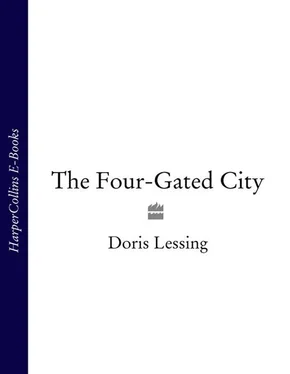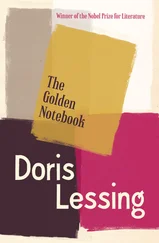1 ...8 9 10 12 13 14 ...59 Glances were again exchanged between Henry and John, and again as if she were not present. ‘Well,’ said John, ‘that is precisely why we are so keen to have you – you see a great many of the people we deal with have had a rather rough time, and one does need someone to handle them who knows what they are talking about.’
‘Perhaps,’ said Martha, ‘having had a rough time as a refugee would include rather more than would be covered by having experience as a barmaid?’
She was now really angry. Really discouraged. Even frightened. After all, such people ran this country, no matter what the papers said. And when you came anywhere near the Maynards and their kind this is what happened. It was like talking to – well, the blind, people blinkered from birth. Which is what they were. What was the point of … one simply had to get out of their way.
The waiter was bringing the bill. The restaurant was full now, it was about ten o’clock, and had more than ever the atmosphere of a family, of people who were at one with each other. And they were off guard now, with a licensed childishness about them, as if, threatened outside, here they found refuge. Across the room, a man with a heightened colour and a rakish look flicked bread pellets at a girl in a fluffy pink sweater, who flicked them back, giggling, while waiters watched indulgently.
The bill was for six pounds.
‘Where are you going, can we lift you?’
‘Thank you, I’d like to walk.’
Henry pushed back his chair. The waiter had three people by him who wanted this table. Getting out and away fast, which was what she wanted, was easy for her.
She walked down Oxford Street; that is, eye-level goods confined behind lit glass moved past her: above were dark weights of masonry. The goods, clothes mostly, were as bad and as tasteless as everything else. This is the greatest city in the world, she kept saying, loitering, but not obviously so, among people window-shopping. The biggest city, the biggest, and this one of the streets whose name I’ve been brought up on, like Piccadilly Circus. The labels of these shops are covetable, sewn on clothes – there was not one object or article she would have cared to own. Of course, there had been a war on. Of course, even five years after such a war, buildings and streets must be propped and shored and patched and unpainted, and cloth must be thinned and impoverished. Of course. But even a yard of war-impoverished cloth can be woven with more sense or art. Good Lord, she found herself thinking, for the thousandth time, what kind of a race is this that chooses, inevitably and invariably, or so it seemed, the ugly, the graceless? Well, here she was and to stay.
The shops ended and sky opened above the trees of Hyde Park. Now here was something different, oh yes, when it came to trees and gardens, then everything was as it ought to be. She walked down the pavements of the Bayswater Road, with the park on one side, balances and patterns of leaf dramatically green where the street lights held them, retreating into mysterious shadow beyond, with the lit moving sky over them. On her right hand, the great ponderous houses that stood so assertively on damp soil. Great ugly grey houses. They were boarded up or empty or in makeshift use; no longer houses; all in a condition of transformation towards being hotels. And unpainted. Ugly. Even in this changing racing wild light, ugly. But she was under the trees that edged the pavement, and they seemed like an extension of the trees of the park, so that it was as if the traffic that poured down the street was riding through softly lit trees which ended here; the grey cliff of buildings on her right being the start of the city. There were now few people. There had begun, from the moment she had left Oxford Street and the shops, that heightened wary atmosphere which meant she must walk careful of her eyes, because in this stretch of the Bayswater Road, men prowled after women. Invisible boundaries, invisibly marked territories: just as, across the river a boundary could be marked by an old hulk of timber with riversalt in its seams, so that one side of it was the riverbank, the other a landlubber’s country, here the corner of a street, or the hour of day could say: Here a certain kind of order ends.
Martha now walked fast, protected by the thick ugliness of Mrs Van’s coat; but she was a ‘young woman’, category ‘young woman’ – yes, she must remember that she was, and that along these pavements, a category of being, ‘man’, prowled beside or behind her. That was what she must be for a few minutes, not Martha or ‘Matty’, only ‘young woman’. A man veered up beside her, muttered an anxious aggressive invitation and dropped behind when she presented to him her aloof lifted profile. He fell back, muttering words she was meant to hear. The greatest city in the world … if only I could understand that it’s a question of trying to see things steadily all the time, then perhaps I could understand it. Martha’s daytime brain had become detached, wary, watchful, on guard – to protect another part of it which had just started to wake, to listen, because of the fast walk through the moving, lit streets. And when this happened – and she never knew when it would – nothing mattered but to protect, to keep the irrelevant at bay. It was this business of having to divide off, make boundaries – it was such a strain. Jimmy and Iris’s café, the bombed streets, the river city where Stella was, this hunters’ street, the great stained damp houses where Henry Matheson’s and John Higham’s parents and grandparents might have lived, one family to a house: even to begin to understand it was … but one’s daytime brain was slotted, compartmented, pigeon-holed …
Now she slowed, almost stopped in surprise at a cool hard getaway look from a young woman who stood with her back to a hedge. Of course, she had passed another invisible boundary. From here until Queensway, the pavements were lined with prostitutes, standing singly or in pairs, dozens of them, along the pavements. But Martha was freer here than she had been in that other territory she had only just left, whose boundary was simply a bisecting street. She was protected precisely by the line of girls for sale, who knew she wasn’t one of their trade union and because their hostile warning faces that said go away, you shouldn’t be here, kept her safe from being accosted. Three kinds of animal here. The women, standing with their backs to the hedges, on sale. The ordinary traffic of the pavement – but a slight traffic, mostly couples hurrying past the marketplace, keeping close under the lights, looking embarrassed, as if they were here by a mistake, yet glancing furtively at the buying and bargaining. The customers, men of all ages, walking slowly past the women, or standing under the trees smoking, making choices. And across the street, policemen, spaced out with twenty or thirty yards between each couple, not looking directly at the haggling and dealing, but observing it sideways to make sure that it went on without incident. Martha walked more slowly than she had had to walk in the part of the street she had left. All the way down the street, by lit airy trees, they stood. Although it lightly drizzled, they wore summer dresses, bare necked, bare shouldered; and high thick sandals with bared insteps; and sometimes they held a jaunty umbrella. But there was no elegance here either. They weren’t well-dressed. They shared the national disposition towards gracelessness. There has been a war on. Suppose one of these men who was making up for the starvation of the war (like Jack, still obsessed by it), approached one of the girls saying: I’d like you to wear … whatever was his fantasy, would she snap back: There’s been a war on, you know? Yes, very probably … Martha found herself imagining rooms where furniture, curtains, objects had charm, had flair, and a girl with charm, flair, undressed slowly to show off wittily charming underclothes – a man’s fantasy? Perhaps in all this city it was only these girls’s rooms where there was anything attractive, gay, rightly made? Well, not from the way they were dressed as they stood on the pavement.
Читать дальше












